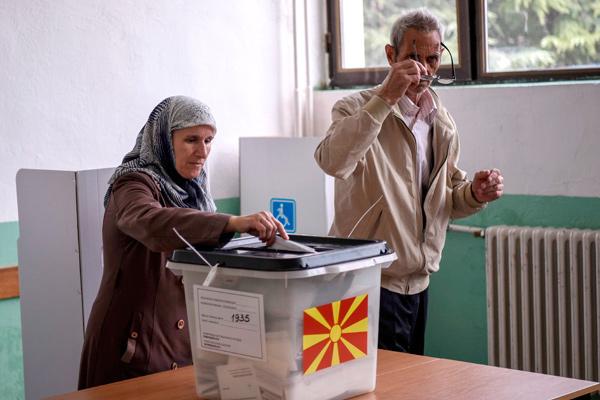You are here
Low turnout as FYRM votes on new name
By AFP - Sep 30,2018 - Last updated at Sep 30,2018

An Albanian couple vote at a polling station on Sunday in Tetovo, as part of a referendum on whether to change the country's name to the ‘Republic of Northern Macedonia’ (AFP photo)
SKOPJE — The Former Yugoslav Republic of Macedonia’s (FYRM) vote on whether to rename the country and end a decades-long spat with Greece was marred by low turnout on Sunday, despite the promise of unlocking a path to EU and NATO membership.
With only two hours left until polling stations were to close at 1700GMT, turnout stood at just 29 per cent, the electoral commission said.
Opponents of the change, who had called for a boycott of the name-change referendum, announced plans for a celebration outside parliament, where they had set up a stage during the afternoon.
Throughout the day, FYRM officials, who asked not to be named, did not hide their concern that turnout might not exceed 50 per cent, a goal they had set two days earlier.
While the FYRM government is likely to call any significant majority in favour of the deal a success, the rightwing opposition may well question the vote's credibility if turnout is below 50 per cent.
The vote is an emotional moment for a country that has struggled for recognition of its name since 1991, when the former Yugoslav republic declared independence.
At the time, Athens kicked up a major fuss, accusing Skopje of stealing the name of its own northern province, which is also called Macedonia.
The dispute dives deep into history with both countries vying to lay claim to Alexander the Great's ancient empire of Macedon, which spanned their territories.
But in June, FYRM new Premier Zoran Zaev and his Greek counterpart Alexis Tsipras reached a landmark compromise under which Athens would drop its objections to the FYRM joining the EU and NATO in return for a change of name.
Zaev has billed the referendum as a painful but "historic" opportunity to break the 27-year-old stalemate.
But the deal has been openly opposed by President Gjorge Ivanov, who is allied with the nationalist opposition and has supported calls for a boycott.
An open door?
Voters began trickling into polling stations around the country shortly after the voting opened.
"I hope that the result will be positive. This referendum will change something if it opens the door to Europe and NATO," said Olivera Argirovska, a 74-year-old retired nurse, after casting her ballot in a high school in the capital Skopje.
"It will change things for the youth," she told AFP.
Few Macedonians are enthused about the new name, saying they have been unfairly bullied by Greece.
"I am not happy and I do not know anyone who likes this deal," said 55-year old Danica Taneska, who admitted voting “no” to the change.
But a desire to anchor their future to the West — and the economic prosperity that it could bring — has been a driving force behind the “yes” vote in one of Europe's poorest nations.
Greece watching closely
The referendum is not binding, but a “yes” majority would give parliament a political mandate to change the constitution.
If the deal is backed in the referendum and ratified by two-thirds of MPs, the Greek parliament will be called on to give it the final stamp of approval.
Sunday's vote is being closely watched across the border in Greece, where nationalists staged a protest against the deal earlier this month.
"We hope for a positive outcome for the proceedings to progress with the constitutional review," Greek government spokesman Dimitris Tzanakopoulos said on the radio.
"Any other result would create a disturbance."
Western Balkans foothold
Europe and the US have campaigned hard for the deal, with many leaders passing through Skopje this month to urge Macedonians to seize the "historic" opportunity.
NATO has already issued an invite — on hold until the deal passes — while EU accession talks are scheduled to begin next year.
The West is keen to have another foothold in the Western Balkans, a region where Russia, which is opposed to NATO expansion, has historically had influence.
At home, those in favour of the deal say a desire for an EU future is helping bind ethnic Macedonians with the Albanian minority, who are broadly pro-West.
While Macedonia avoided the full-scale inter-ethnic wars that rippled across the region during the collapse of Yugoslavia, it was roiled by an Albanian insurgency in 2001 that left more than 100 dead.
A peace deal was reached later that year granting Albanians more political rights, but tensions have remained.
"This is the first time I am seeing Macedonians and Albanians campaigning together for common goals," Besa Arifi, a law professor, told AFP.
"This will give us more opportunities to unite all citizens around shared values," he added.
Related Articles
SKOPJE, Republic of North Macedonia — Several thousand people protested on Saturday in North Macedonia’s capital Skopje against a proposal a
BRUSSELS — Greece recalled its ambassador from Austria on Thursday and warned it would not be treated as "Europe's Lebanon" as the migrant c
AMMAN — Jordan's Ambassador to Turkey Ismail Rifai on Sunday presented his credentials to Former Yugoslav Republic of Macedonian (FYRM) Pres
















